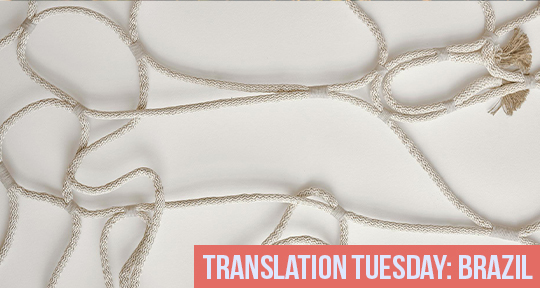This Translation Tuesday, we present three meditations from Brazil on the fluid qualities of the words that describe and “name” us. Floresta’s first poem rankles at the tyranny of the verb “to be” at its categorical, othering, murdering worst. In his second, the verb approaches us far more softly and trepidatiously; it’s domesticated and unthreatening now—a balm, even. The forth swings us back and forth across the tenses, exploring the miraculous potential of the word to both travel into a minutely specific past, and telescope forwards ad infinitum.
Translators Jamille Pinheiro Dias and Alex Brostoff were drawn to Floresta’s poems for their evocative treatment of the contradictions of grammar. They explain in their note:
“Paradoxically, while “the form of the verb” is murderous, it also summons a matrilineal bond that recalls rice and beans, the lack and excesses of gendered evocation. That language others us by naming who we are not, “pressed in a time / that is not mine,” recalls the very forms through which translation at once opens up and shuts down possibilities of naming. The form of the verb genders us, and through the violence of nomination, it precedes and exceeds us: across time, bodies, languages. Such forms constrict and proliferate in translation.”
the form of the verb
that names me
the form
the form of the verb
that names me
the form
in the third person
not the first
not the second
but third
the form of the verb that names me is wicked
the form of the verb
that names me
is a killer
the form of the verb
in the third person
puts me down while
another form
others me
the form of the verb ii
that names me
is pale
well-behaved
a compatriot
tacit
the form of the verb
that names me
is warm
comforts who I am not
the form of the verb
that names me
is also enough for me
pressed in a time
that is not mine
the form of the verb iii
that names me
is
in the garlic crushed
into my mother’s beans
the form of the verb
that names me
was
in my grandmother’s rice
the form of the verb
was
in the lack or excess of water
inside the house
in a power outage
in the spotty internet
the form of the verb
that names me
came very early
even before me
and will come after
if it depends on those others
who impose
their vernaculars
Translated from the Portuguese by Jamille Pinheiro Dias and Alex Brostoff
Floresta is a poet, translator, and a graduate student in Foreign Languages, Literatures, and Translation at the University of São Paulo. His interests and practices live in the spoken, written, and translated word; that is, in its mistakes and lack of truth, in its trickery. He is currently researching the word through the lens of translation studies, proposing ọfọ̀ translation, for ọfọ̀ is a Yorùbá term meaning “spell” or “enchantment,” a linguistic continuum, a translatory-performative movement stemming from spoken and gestural words in their varied forms in the Candomblé Kétu communities. His artistic practice is based on studies of transmasculinities, Yorùbá epistemologies, as well as literature and theory by people of color and LGBTQI+ communities. He has translated books by bell hooks, Saidiya Hartman, Dionne Brand, Nella Larsen, and Jamaica Kincaid, among others. His work has been a semi-finalist in the translation category of the 65th Jabuti Prize, and his books include Poemas crus (Patuá, 2016), Genealogia (Móri Zines, 2019), Panaceia (Urutau, 2020 – honorable mention for the 2nd Mix Literary prize), and Rio pequeno (Círculo de Poemas, 2022 – semi-finalist for the 65th Jabuti Prize).
Jamille Pinheiro Dias was born in Belém, in the Brazilian Amazon, in 1983. As a translator, she dedicated herself to works by bell hooks, Monique Wittig, Sara Ahmed, Judith Butler, Silvia Federici and Ailton Krenak, among others. Her research focuses on the intersection of Environmental Humanities, translation studies, and Indigenous arts and activism. She is currently the director of the Centre for Latin American and Caribbean Studies at the University of London, where she also works as a lecturer. She was previously a von der Heyden Fellow and an affiliate faculty member at the Franklin Humanities Institute’s Amazon Lab at Duke University. During the fall term of 2024, she will be at Brown University as a Craig M. Cogut Visiting Professor in Latin American and Caribbean Studies.
Alex Brostoff is a writer, translator, and Assistant Professor of English at Kenyon College. Their interdisciplinary research interests converge at the crossroads of genre-hybrid literatures, critical theory, and trans and queer cultural production in modern and contemporary hemispheric American studies. In addition to co-translating Indigenous leader Ailton Krenak’s Life Is Not Useful (Polity Press, 2024), and Ancestral Future (Polity Press, 2024), their translations from Portuguese and Spanish have appeared in journals such as Representations, Critical Times,
South Atlantic Quarterly, and Reading in Translation, as well as at the Museum of Modern Art, and elsewhere. They are the co-editor of Autotheories (The MIT Press, 2025) and Reassignments: Trans and Sex from the Clinical to the Critical (Fordham University Press, under advance contract) as well as special issues of ASAP/Journal on autotheory (2021) and College Literature on trans literatures (forthcoming, 2025).
*****
Read more on the Asymptote blog:

